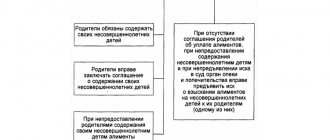In situations where the recipient of alimony has debts that he cannot pay off, one of the frequently asked questions is whether bailiffs can seize child support.
The relevance of this issue is also due to the fact that money received as child support is often the only means to provide him with the necessary food, medicines, clothing, and so on.
Can a bailiff seize alimony payments?
Do bailiffs have the right to withdraw money from alimony? To answer this question in detail, let’s look at the powers of the bailiff. First of all, he is obliged to collect information about the debtor’s funds. The FSSP employee must identify sources of regular income, such as:
- salary;
- scholarship;
- pension;
- bank accounts (debit and savings);
- savings books;
- payment cards.
If it is not possible to find another way to pay the debt, then the law allows the funds to be seized. But often by mistake, FSSP employees seize even the account in which alimony payments are stored.
Expert opinion
Sergey Nikolaevich
Judge, judicial experience - 20 years
Important information! According to Art. No. 102 Federal Law 299 “On Enforcement Proceedings”, alimony funds intended for the maintenance of a minor cannot be seized to pay debts on: loans, housing and communal services receipts, civil agreements, court decisions and writs of execution ( IL ).
The seizure of alimony money, as well as its write-off, are absolutely illegal.
Do bailiffs have the right to withdraw alimony?
It is also prohibited to write off such money from accounts.
However, funds that are either alimony or not are transferred to the same account. And often, separating payments received for child support becomes a difficult task. Therefore, lawyers recommend that citizens create separate accounts to receive alimony payments on them. This will protect your accounts from being seized, and the money on them from being illegally written off.
The bailiff arrested alimony: what to do?
As we have already found out, the legislation answers the question: “Can alimony be seized for parental debts?” answers sharply in the negative.
But, if it so happens that the child benefit is still seized, the illegal decree of the bailiff must be immediately cancelled. It is the owner of the bank account to which the child benefit is accrued who must initiate the cancellation of this arrest. Here is an algorithm of actions that should be taken for this:
- First, you need to obtain a copy of the seizure order by contacting the SSP or the bank.
- Then draw up and submit a complaint to a higher-ranking person at the SPP, reporting the illegality of the bailiff’s actions, demanding that justice be restored.
The following must be attached to the text of the complaint:
- identification;
- birth certificate of the baby;
- court verdict, or alimony agreement - documents establishing the procedure for alimony payments;
- a certificate taken from the bank indicating the following information: the intended purpose of the payments, the period and dates of payments, the name of the alimony payer and the amount of payments.
Expert opinion
Elena Vladimirovna
Bailiff for the Petrogradsky district of St. Petersburg, work experience - 3 years
Note! Having received a complaint, the management person at the SSP is obliged to immediately take action and remove the illegal seizure of children’s money. If this does not happen, then the injured person should boldly go to court with a claim to cancel the arrest and bring the guilty officials to justice.
Legal aspects
Bailiffs receive information about all bank accounts of the debtor. Funds are withheld from wages, scholarships, and pensions. If there are not enough funds, FSSP employees withdraw funds from other open accounts and may seize alimony payments. In accordance with current legislation, seizure of child benefits to repay a loan is considered an illegal action. There are no exceptions in this case. Funds transferred to the bank are considered the property of the child, not the parents.
Procedure and terms of money return
We have already found out whether bailiffs can seize alimony intended for a child - they cannot. But the harsh realities of our reality are such that such lawlessness still happens from time to time. So, what to do if the money is seized?
You should know! Most debtors learn about the fact of arrest only at the moment when they cannot receive the children's money in due time. They, not understanding the situation, ask the bank to provide clarification on the fact that has arisen and only then learn about the arrest.
After receiving this information, the defaulter has only 10 days to appeal the lawlessness of the bailiffs. You can stop blocking your alimony account by writing a statement. In order to return previously withheld money, it is necessary to add an additional clause to the text of this application. Unfortunately, automatic refunds are not possible and this service is not provided.
If the person receiving alimony writes an application for the return of the amount withdrawn by the bailiffs, then, according to the bank’s calculations, the money will be returned within a month ( 30 days ) from the moment the request is submitted.
What to do if bailiffs have written off money from your account
The refund process is not an easy task for those without relevant experience. It is possible that in order to get back the money owed to the child, you will have to resort to legal assistance.
To file a competent claim, it is recommended to entrust its preparation to a professional lawyer. A specialist in this field will be able to collect a package of necessary documents, prepare an application and take part in the trial. A favorable outcome of a case almost always depends on the professionalism of the person involved in the process.
What cannot be arrested?
The legislation establishes the types of accounts that cannot be seized. Following the text of Art. No. 101 Federal Law “On Enforcement Proceedings”, the following types of income of citizens cannot be detained or seized:
- Money received as compensation for damage caused to the debtor's health.
- Funds that were received from the state budget in the event of the loss of a breadwinner by the debtor's family.
- Money assigned as compensation, which is paid to the debtor due to his receipt of work-related injuries and injuries (to disabled people).
- Funds paid as compensation to victims of radiation and man-made disasters.
- Money allocated by the state for a program to care for citizens who have lost their ability to work.
- Monthly compensation payments transferred to citizens on the basis of orders of federal legislation.
- Alimony and other payments transferred for the maintenance of a minor.
- Monetary compensation established by labor legislation.
Art. No. 103 of the Federal Law clearly answers the question: is it possible to seize child support? Such accounts cannot be seized for debts incurred by the child’s mother/father, since this money in fact does not belong to the debtor parents, but directly to the children themselves.
Powers of bailiffs to enforce collection
The enforcement procedure is carried out by bailiffs. FSSP employees have the right to seize the property and money of debtors in the event of various types of arrears. The powers and duties of bailiffs are enshrined in Article No. 12 of Federal Law No. 118 “On Bodies of Enforcement of Court Decisions” (as amended in 2020). In addition to this regulatory document, service employees are also guided by additional legal acts.
Law regulating the activities of the FSSP
Based on Article No. 2 of Federal Law No. 229 (as amended and additionally entered into force in 2020), all actions of bailiffs are dictated by the Constitution of Russia and the specified federal document. In addition, service employees rely on legal acts, orders of the President, Government and Ministry of Justice of the Russian Federation.
Actions of bailiffs in relation to the debtor
If enforcement proceedings have been opened against a citizen, then the bailiff has the right to use all legal means to obtain money.
In addition to the general collection of information about the debtor’s funds and property, the employee can establish information regarding sources of income:
- salary;
- scholarship;
- pension accruals;
- bank accounts;
- savings deposits and books;
- debit cards.
Watch the video: “How to protect your money from bailiffs.
What accounts cannot be seized.” When a defaulter refuses to voluntarily repay a loan, a fine from the traffic police or other obligatory payments, the bailiff is authorized to seize money and/or property. Additional enforcement measures include fines and restrictions on movement.
What income cannot be seized?
At the legislative level, a separate category of accounts is established from which debts cannot be collected.
In accordance with the provisions of Article No. 101 of Federal Law No. 229, the following sources of income of citizens are not allowed to be blocked:
- Funds sent as compensation for damage to the health of the defaulter.
- A benefit transferred from the state budget in the event of the loss of a breadwinner by the debtor's family.
- Grants assigned to a citizen due to injury received while performing official duties, including those resulting in disability.
- Material support for people affected by disasters.
- State and regional compensation intended for caring for incapacitated people.
- Other monthly payments assigned according to federal orders.
- Alimony and other types of child benefits allocated for the provision and maintenance of a child.
- Compensation within the framework of the Russian Labor Code.
Possibility of seizure by bailiffs of child support
Articles No. 101 and No. 103 of Federal Law No. 229 clearly indicate whether bailiffs can seize alimony payments. In accordance with the provisions of the regulatory act, such actions are unlawful, since in fact they are intended for a minor. Therefore, they do not belong to the debtor parent.
Social work or arrest. Alimentarians will have a hard time.
Thus, if the bailiff blocks the bank account to which alimony payments are transferred, the parent has the right to complain and challenge such actions. This is due to the fact that the child is not responsible for the debts of the father and/or mother. To remove a seizure from a card, there are certain regulations that will allow you to return the money quickly and avoid further deductions.
Drawing up a complaint
The question: “Can bailiffs seize the account to which child support payments are received?” has a clearly negative answer. But if this happens, then the very first step that should be taken after receiving the arrest document is to write a complaint.
The complaint is made to the head of the FSSP. Most often, the document is submitted to the head of the department in which the bailiff who made the decision to seize the account is employed.
In the text of the complaint it is necessary to indicate the factual circumstances of the incident, referring to Art. No. 101 “On enforcement proceedings”. According to the requirements of this article, it is prohibited to create any obstacles to children’s money going to a special child support account. The completed complaint must be accompanied by a documentary package that includes:
- identity card of the recipient - debtor;
- a certificate proving the fact of the birth of the baby;
- a document on the basis of which child payments are made: either an agreement on alimony between parents, or a court order and court decision;
- a bank statement confirming the intended purpose of alimony payments.
If the debtor does not understand how to return alimony from a seized account, it is best to seek support from an experienced lawyer. The specialist will competently draw up a document, collect all the papers and be able to defend your infringed right.
How to make an application
The document can be prepared in any form. But, it must contain all the necessary information for the senior bailiff to fully and comprehensively study the issue that has arisen and make a positive decision to lift the arrest.
Thus, the application must necessarily include:
- Full information about the applicant (full name, contact information);
- Information about the seized account and the bank in which it is opened;
- Information about the document according to which funds were paid for the child (agreement, court document);
- Information about a statement received from the bank containing confirmation that the money in the account is alimony;
- Request to lift the arrest.
The document must be signed by the applicant or another person with a power of attorney. Along with the application, you must submit copies of the following documents to the SSP:
- Applicant's passport;
- Statement from the bank;
- An alimony agreement, or a court decision under which alimony was paid;
- Other documents confirming the information specified in the application.
Procedure for considering a complaint
After submitting an application and a documentary package, the seizure from the alimony account is immediately removed, in accordance with the Federal Law “On Enforcement Proceedings”. But unfortunately, the requirements of this law are not always fulfilled properly.
It often happens that bailiffs may initiate delays in lifting the seizure from the alimony account. Such delay always has an extremely negative impact on the child. For example, if alimony is the only source of income for the baby and his mother.
Submitting documents to the SSP and the bank
Documents must be transferred to the SSP immediately, before the bailiffs have time to write them off. It is best to submit the application to the SSP office against receipt. The law also does not prohibit sending documents by post; however, in this case, it is not recommended to waste the time that it may take.
Simultaneously with submitting documents to the SSP, you will need to notify the bank by handing over the same package of documents to them. The payer should also be notified of the arrest imposed on the account. While the issue is being resolved with the bank and SSP, money can be transferred to the recipient by mail, or in cash against a receipt.
Drawing up a statement to the bailiff
When drawing up an application addressed to the bailiff or higher management, the following information is required:
- FSSP address where the application is sent;
- passport details of the applicant;
- a request that includes a brief description of the situation;
- indication of exact information about when and by whom the arrest was made;
- description of existing debt obligations, indicating the amount of debt;
- designation of the writ of execution confirming the fact that the seized money was intended for the child in the form of alimony benefits;
- statement of a request to cancel the arrest, by reference to the relevant law;
- a list of documents that are attached to the application.
The application can be submitted in two ways: in person or by mail.
The procedure for appealing the actions of bailiffs
In practice, situations often arise when bailiffs unreasonably impose restrictions on defaulters or seize money in excess of the amount specified in the seizure order. Sometimes it happens that bank employees, due to their own inattention or failures in the operation of banking electronic systems, incorrectly comply with the bailiff’s requirements and freeze an excessive amount of funds. If this happens, then it is not the fault of bank employees, but of the bailiff, since, according to the law, he must monitor the execution of his own decision and immediately return the excessively seized money.
If funds transferred to the debtor as alimony allowance were frozen in the account, then there are 2 options:
- Cover the existing debt before the bailiff begins to forcibly take money from bank accounts.
- Appeal the actions of the bailiff to his immediate superior or to the district court. Please note that there is no point in complaining to the prosecutor's office, since now it cannot check the actions of the bailiff for compliance with the laws.
In administrative proceedings
An individual who believes that an arrest order issued by a bailiff is contrary to current legislation has only 10 days to appeal. They are counted from the moment of receipt of the controversial decision or from the moment when the person learned about the content of this decision. The application is submitted to the senior bailiff of the department, if the controversial resolution was not approved by him, or to the chief bailiff of the constituent entity of Russia, if the controversial resolution was approved by the senior bailiff of the department.
The application must include the following information:
- Identification data of the bailiff who issued the controversial resolution (full name, position, place of work) and details of the controversial resolution.
- Identification data of the person who sent the complaint (full name and place of residence).
- Grounds for appeal.
- The applicant's demands (to lift the arrest or return the money).
A sample application can be downloaded from here. In addition, it is advisable to submit additional documents confirming the arguments of the complaint:
- A certificate issued on the occasion of the birth of a child.
- An account statement containing information about the purpose, amount and date of payments received.
- A copy of the alimony agreement or court decision (order). These documents prove that the alimony pays money for maintenance legally.
- A copy of the disputed resolution.
- Copy of the passport.
The superior manager who accepted the application has 10 days to respond to it. The period is counted from the date of receipt of the application.
Due to the fact that the seizure of alimony money must be immediately lifted if a positive decision on the complaint is made, usually the resolution adopted by a superior manager based on the consideration of the complaint contains a requirement to immediately unfreeze the alimony allowance. This demand is addressed to the bailiff who issued the illegal arrest order.
After this, the applicant must monitor the process of unfreezing the funds or returning the money so that the process is not unduly delayed. If this happens, or a response from a superior has still not been received, or the applicant has no desire to deal with the bailiffs, then you need to go to court.
In lawsuit proceedings
The place of proceedings is the district court. Jurisdiction is determined by the location of the department staffed by the bailiff who issued the controversial resolution.
If the plaintiff has not previously tried to appeal the decision to a higher-ranking chief of the bailiff service, then he has 10 days to challenge it from the date of receipt of the arrest order. Otherwise, the application must describe the circumstances (unreasonable inaction of the bailiff, lack of response from the immediate superior of the bailiff) that prevented the submission of documents on time and ask for its reinstatement. A sample application can be found by clicking on this link.
Before submitting the application to the court office, you need to prepare attachments to the claim and pay a fee. The list of applications and fees are described below. Payment details are available on the website of the judicial authority.
No more than 10 days should pass from the day the court accepts the documents until the day the decision is made. Cases regarding the removal of seizure from an alimony account and the return of money, as a rule, are not particularly difficult, so they usually do not drag on. The main thing is to collect a complete list of the applications listed below, since in court they will play the role of evidence confirming the plaintiff’s position.
When the court recognizes that the applicant is right, it will oblige the bailiff to cancel the illegal arrest and return the money if it was seized. The bailiff must perform these actions within a month from the date of entry into force of the court decision.
If the court takes the side of the bailiff, then all is not lost for the applicant, since the law allows you to challenge the decision through the appellate authority. The deadline for filing a complaint in this case is 1 month from the date of production of the final form of the court decision.
Going to court
Statistics show that the largest number of complaints against bailiffs is related to their indifference and inaction. And when child support money is the only source of living, then there is no time for lengthy negotiations with FSSP employees.
A painful situation needs to be resolved extremely quickly. And, citizens’ complaints are considered by employees of the very institution where the guilty bailiff himself works. Therefore, it makes sense to start defending your rights in court. The algorithm of actions when going to court is as follows:
- Collect documents that were necessary for an administrative appeal, and supplement them with correspondence with FSSP employees (complaint and response to it).
- File a claim.
- Pay the state fee.
In a statement of claim to a judicial authority, the applicant must literally demand the following:
- removing the seizure from the alimony account;
- punishment of the guilty bailiff who imposed an illegal arrest;
- oblige bailiffs to pay compensation for moral damage caused.
Expert opinion
Sergey Nikolaevich
Judge, judicial experience - 20 years
You should know! If a parent confidently stands up for his rights and the rights of his child in court, then he can count on receiving additional money paid in the form of compensation from the FSSP. But, for this you will have to spend a lot of time and nerves, or contact an experienced lawyer.
Other forms of appeal
If there is no action on the part of the FSSP, after writing a complaint, an appeal should be made to the prosecutor or to the court. The statement of claim should demand the return of the withheld amount of alimony and the prosecution of the bailiff who made the mistake. The same documents must be attached to the application. Additionally, a receipt for payment of the state duty in the amount of 300 rubles is attached. When drawing up a statement of claim, it is recommended to describe the situation in detail and indicate all the details. This approach will help avoid delaying the process. The court recognizes the complaint after reading the statement of claim. After this, the arrest is lifted, and the funds are returned to the bank account. Additionally, it is recommended to contact the prosecutor’s office regarding the actions or inactions of officials. The complaint should be drawn up in any form; its content should be close to the application. Challenging the bailiff's decision is carried out in a court of general jurisdiction. After confirming the legality of the plaintiff’s demands, the bailiff’s decision is declared illegal.
Find out about your debt
Free online check of legal debt
Find out the debt
List of documents for filing a claim
The following documentary “arguments” must be attached to the complaint (or claim):
- A copy of your ID.
- A copy of the child's birth certificate.
- IL (court order or voluntary alimony agreement) – any of these documents that serves as the basis for imposing obligations for alimony payments.
- A copy of the bailiff's decree stating that the alimony account in the bank has been seized due to the debt on the loan (the decree should be obtained by contacting either the bank or the FSSP branch).
- A certificate from the bank containing the following information:
- Full name of the payer;
- details of the account that has been seized;
- duration of payment transfers and frequency of financial transfers;
- purpose of money transfers;
- dates and amounts of alimony.
State duty amount
This category of administrative claims involves payment in favor of the state treasury in the amount of 300 rubles .
Step-by-step steps to remove the arrest and return written-off money
Despite the legal prohibition of withholding alimony to pay off debt, in reality such situations arise everywhere. In the process of enforcement actions, FSSP employees make a request to financial institutions about whether the defaulter has valid accounts.
By law, the organization that services a citizen’s banking transactions is required to report this fact, but detailed information is not provided. Thus, the bailiff does not know about the intended purpose of the incoming funds and blocks the card. For the service employee, the money is impersonal, so an arrest is initiated. The offense on the part of the FSSP has only an indirect background.
In such a situation, a minor may be left without a livelihood. The parent must act quickly to restore rights and issue a refund. Step-by-step instructions will help you return alimony written off by the bailiff.
Stage No. 1: Contacting authorities depending on the situation
If funds in the alimony account are blocked, it is necessary to initiate a procedure for appealing the illegal actions of the bailiff. The applicant’s role is to hold the bank card to which payments are credited. The complaint is filed in the order of subordination.
Senior bailiff
The first appeal is addressed to the director of the federal service unit. As a rule, a complaint is submitted to the head of the department in which the bailiff supervising the debt case works.
The document should state the offense with reference to Article No. 101 of Federal Law No. 229.
Based on this provision, the official does not have the right to impose restrictions on child payments and alimony.
The following documents are additionally attached to the complaint:
- a photocopy of the passport of the citizen of the Russian Federation who is the debtor;
- birth certificate – the actual recipient of the funds;
- papers confirming monthly payments - a peace agreement between the father and mother of the child, a court decision, a notarial deed;
- bank statement indicating the purpose of the transaction.
Prosecutor's office
Bailiffs do not have the right to withdraw money from alimony, so the parent can file a claim with the prosecutor.
Often, a petition is submitted if the decision of the head of the FSSP department does not satisfy the citizen. It is noteworthy that both the payer and the recipient may face illegal actions of an FSSP employee. A complaint to the prosecutor's office is an effective way to resolve a dispute. Reasons for appeal:
- Issuance of a resolution in violation of legislative norms within the framework of enforcement proceedings. For each action, the bailiff generates such a document.
- Inaction of an official in relation to the claimant and payer of alimony.
- Other illegal activities, including abuse of authority.
An authorized person conducts a supervisory inspection. Notifies the parties of the results obtained. If violations are detected, the prosecutor makes a proposal to eliminate shortcomings in the work of the bailiff. After taking appropriate measures, the FSSP employee sends a report to the authority.
Judicial authority
According to statistical information, the bulk of complaints against the work of bailiffs are related to their inaction. Often, in the process of debt collection, a FSSP employee may block child support, which is the child’s only source of existence. In such situations, the parent does not have time to sort things out with the official.
The conflict that has arisen must be resolved promptly. Due to the fact that the complaint is considered by the employee’s colleagues, an effective way to return funds is to go to court.
To do this you will need to follow the algorithm:
- Collect the documents necessary to initiate an administrative claim. Correspondence with the bailiff, i.e. the complaint and the response to it by higher management, serves as a supplement to the evidence base.
- Formation of an application.
Payment of the state duty, according to Article No. 333.36 of the Tax Code of Russia (2020 edition), is not required, since the basis for the litigation is an offense by an official.
The pleading part of the claim must include the following requirements:
- unblocking the account where alimony payments are credited;
- imposition of disciplinary punishment against the FSSP employee who issued such a decision;
- oblige the federal service unit to return the seized money and compensate for moral damage.
Stage No. 2: Obtaining a certificate of the intended purpose of funds
The amount of deduction and types of income from which alimony is written off.
At the legislative level, the bailiff does not have the right to seize child benefits or alimony. However, during the production process for the FSSP employee, the funds in the debtor’s accounts are anonymized due to legislative nuances. Therefore, the recipient of the payments must provide a certificate of the intended purpose of the money.
To do this, you need to contact an organization that transfers funds, i.e., it depends on how and by whom alimony is withheld. For example, if the payer is employed, then at the place of work. When an agreement is concluded between the father and mother of the child, then go to the bank for an extended statement.
Stage No. 3: Drawing up an application (samples)
Here you can download sample applications for each authority:
- Complaint addressed to the senior bailiff.
- Appeal to the prosecutor's office about unauthorized write-off of alimony.
- Administrative claim against the bailiff.
What documents may be needed
In addition to the completed claim, you must attach the following documents:
- Photocopy of the passport of a citizen of the Russian Federation.
- A copy of the child's birth certificate.
- IL, within the framework of which alimony is seized. Additional documents are a decision of a judicial authority or a notarized agreement between parents.
- The bailiff's decision to block the bank account due to the resulting arrears to the creditor. This document is requested from the FSSP or a financial institution.
- A certificate from the bank indicating the following information:
- account holder's name form;
- details of the blocked card;
- duration and frequency of transactions;
- the intended purpose of the incoming money;
- date and amount of alimony payments.
Stage No. 4: Wait for the decision of the supervisory authority
After filing a complaint with the FSSP, the prosecutor's office or an application to higher authorities, the citizen must wait for a decision to be made.
Each authority has a separate time limit for consideration of the claim:
Table 1.
| Supervisory agency | Note | Period |
| Senior bailiff | Reviewed by an official with appropriate authority. | 10 working days from the date of registration of the application |
| Prosecutor | The complaint and the territorial affiliation of the application are being verified. The citizen is notified of all actions in writing. | 1 month |
| Judicial authority | The maximum period is allotted for making a decision on complex administrative claims related to the actions or inaction of an official. | from 10 days to 30 calendar days |
Stage No. 5: Transfer of the decision to the FSSP
If a complaint about illegal debiting of funds from an alimony account by a bailiff is satisfied, you must contact the FSSP department. The employee can personally submit the relevant resolution or instruction. This will speed up the refund procedure.
Summary
After reading this article, you found out whether bailiffs have the legal right to seize child support. Let's summarize.
If you are a debtor, and money intended for the maintenance of a minor child is seized from your alimony account, you should first immediately contact the head of the FSSP, and then go to court (in the case where the leadership of the FSSP does not react in any way).
According to the law, alimony cannot be seized under any circumstances. This money, despite the fact that the debtor receives it, actually belongs to the child: ah, the child cannot be a debtor.
A comprehensive documentary package must be attached to the complaint. You must apply within 10 days from the moment the account was seized; or when the recipient of child benefits (the wife of the alimony payer) became aware of such an offense on the part of the bailiffs.
How to appeal an illegal seizure of alimony payments
To appeal against the illegal actions of a bailiff, the interested person must contact the head of the FSSP department or directly to the court. The complaint is submitted within 10 working days from the moment the current account is seized or from the moment the person is informed about the seizure of the account.
The complaint is written in two copies: the first is sent for consideration to the boss, and the second copy with the date and number of the incoming document remains with the applicant. The second copy will serve as proof that the person applied to appeal against illegal actions.
If the head of the FSSP did not react in any way to the appeal and the illegal decision was not annulled, then the parent initiates legal proceedings.
Regulatory framework
| Legislation | Articles |
| Tax Code (Part 2) | Article 333.19 describes the amounts of money that the plaintiff must spend to pay the state fee. |
| Code of Administrative Procedure | Chapter 22 contains rules establishing the procedure for appealing decisions of bailiffs. |
| Federal Law “On Enforcement Proceedings” | Article 81 establishes the algorithm of actions according to which the money of alimony defaulter is seized. Article 101 describes the categories of income that cannot be forcibly taken from an alimony defaulter, including arrest. Article 122 establishes the maximum period of time for challenging the actions of bailiffs. Article 123 describes the circle of persons examining complaints against bailiffs. Article 124 contains requirements for the content of the complaint. Article 126 sets the maximum period of time for a decision on a complaint by a superior manager. |
| Civil Procedure Code | Article 446 establishes a list of property assets that cannot be taken away in enforcement proceedings. |
| Code of Administrative Offenses | Article 17.14 contains the amounts of fines imposed on individuals and organizations for failure to comply with the requirements of bailiffs. |
Bailiffs' rights
In accordance with the norms of law, bailiffs of the Russian Federation are allowed to take into account and seize the debtor’s funds and income to the extent necessary to pay off all his obligations.
If a person does not have an official and permanent source of income, then the bailiff must send relevant requests to financial institutions. Sending such a request is necessary in order to identify all accounts of various types registered to the debtor. If such accounts are identified, the bailiff may decide to block the card and write off the debt from it.
Expert opinion
Marina Bespalaya
In 2011 she graduated from the University of Internal Affairs with a degree in jurisprudence. In 2013, master's degree course, specialty "law". In 2010-2011, a course at Portland State University (USA) at the Faculty of Criminal Law and Criminology. Since 2011 - practicing lawyer.
In order to eliminate potential disputes, legislative changes have come into effect that oblige the child’s guardian to issue a separate card where the child’s allowance will be received. Such cards provide for the registration of a separate account. The bank card number is not transmitted to the FSSP and cannot be used to withhold money to pay off other types of debt.
In accordance with the requirements of the regulations, seizure of bank accounts is possible only in relation to debit cards. But, unfortunately, due to workload, bailiffs sometimes make mistakes. Therefore, in practice, situations where alimony was seized by bailiffs happen quite often.
According to the requirements of Article 101 of Federal Law No. 229, alimony cannot be included in the category of funds at the expense of which the following types of debts cannot be repaid:
- Obligations of the debtor for previously taken loans.
- Payments for utilities.
- Debts under agreements on the maintenance of citizens (dependents).
To what account do payments for the maintenance of a minor go?
If a citizen’s account for transferring child support is seized, this situation cannot be ignored. Article 60 of the Family Code of the Russian Federation indicates that the alimony funds that the parent transfers for the maintenance of the child are at the disposal of the other parent - the one with whom the child actually lives. This wording means that the money goes to the parent’s account, but the parent is assigned the obligation to spend the received amounts in the interests of the child.
The same article of the Family Code of the Russian Federation establishes the possibility of transferring part of the funds, no more than 50%, to a separate account opened in the name of the minor himself. This procedure is approved by the court, and the court, in making a decision to open a separate account, is based on the interests of the child. For example, if the parent with whom the minor lives improperly fulfills his duties, spends the funds transferred by the other parent not on the child, and does not provide him with the necessary lifestyle, then, at the insistence of the payer, the court has the right to make such a decision. This rule is provided for in paragraph 33 of the Resolution of the Plenum of the Supreme Court of the Russian Federation dated December 26, 2017 No. 56.
Why is the account and card blocked?
Cards are blocked as part of enforcement proceedings. To protect property rights, for example, to recover a debt or compensate for damage, a citizen or organization has the right to go to court. The court decision declares the debtor’s obligation to pay the claimant a certain amount. But the court itself does not have the tools to force the debtor to pay.
Enforcement of the execution of a court decision is carried out by the Bailiff Service of the Russian Federation, where the claimant has the right to apply after the court decision enters into force. Enforcement proceedings are initiated on the basis of executive documents, which are: a writ of execution, a court order or a notarial agreement on alimony.
Bailiffs accept the claimant's application and the writ of execution for execution, issue a resolution to initiate enforcement proceedings, invite the debtor to fulfill the obligation voluntarily, and if voluntary fulfillment does not occur, they collect the debt forcibly. Seizure of cards is one of the measures within the framework of such forced collection.
Thus, if the bailiffs seized a card with alimony, this means that enforcement proceedings have been initiated against the recipient, his account has been discovered and the bailiffs do not know the real source of the money in this account.







